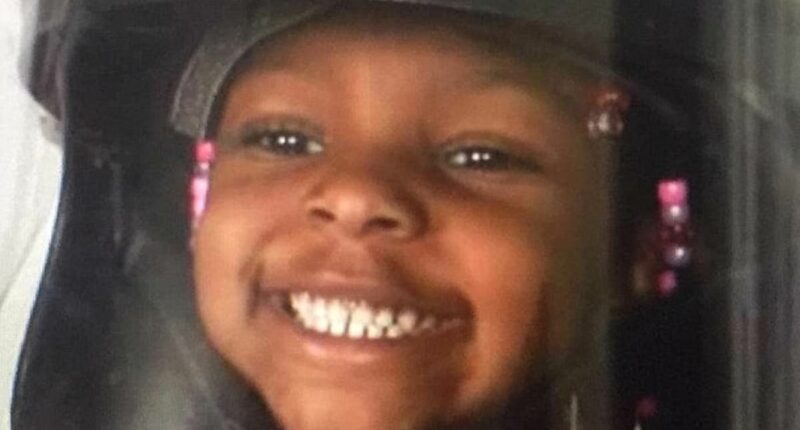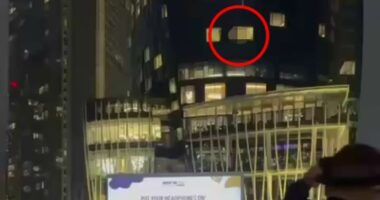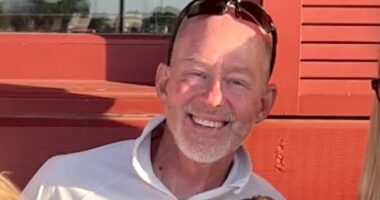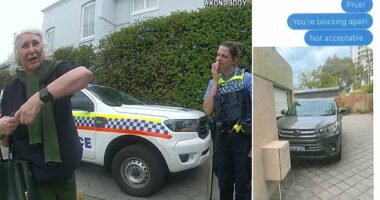Share this @internewscast.com
A woman who narrowly escaped becoming the first Australian executed in the US has attributed her stepdaughter’s death to antipsychotic medication.
Lisa Marie Cunningham, 51, hailing from Adelaide, has been incarcerated for over seven years in a US maximum-security facility following the death of her seven-year-old stepdaughter, Sanaa, in Phoenix, Arizona, in 2017.
Cunningham and her husband, Germayne, 46, who previously served as a robbery-squad detective, face charges of first-degree felony murder and have been imprisoned for nearly eight years.
The charge means the prosecution believes the couple murdered the seven-year-old while committing a felony, in this case child abuse.
Their trial, delayed for extensive periods partly due to Covid-related backlogs, is scheduled to commence next month after Arizona state prosecutors dropped the death penalty in February.
The pair have pleaded not guilty to all charges including murder and child abuse.
In a 7News Spotlight interview aired on Sunday, Cunningham claimed that her stepdaughter’s death resulted from the child being prescribed an antipsychotic drug.
‘I think she died because of (the drug),’ she said from Estrella Women’s Jail, near Phoenix.

Lisa Marie Cunningham, accused of murdering her young daughter in the US, has pointed to antipsychotic medication as the cause of her child’s death.

Sanaa (pictured) died from sepsis related to a chest infection, an abscess in her right foot and multiple skin ulcers

State prosecutors allege Cunningham (pictured) and her American husband, Germayne, abused Sanaa and killed her by tying her down so she couldn’t expel fluid from her lungs
The child’s behaviour had changed and she was taken to multiple doctors before she was prescribed the drug.
‘(It) kills people all the time.
‘After about a week of her being on it, we started to research it online. And that’s when I said, this drug’s not even supposed to be given to anybody unless they’re 13.’
An autopsy found Sanaa died from sepsis related to a chest infection, an abscess in her right foot and multiple skin ulcers.
The report also detailed more than 100 cuts or bruises, but ruled the little girl’s death as ‘undetermined’, rather than ‘homicide’.
However, Cunningham angrily denied she harmed her daughter and claimed the injuries were self-inflicted.
‘How dare you, or anybody else, get to shame parents because they have a child that self-harms,’ she said.
Sanaa was diagnosed with an unspecified schizophrenia spectrum disorder.
She was one of Cunningham’s two children from a prior marriage. Germayne also had two children, and the couple had another two kids of their own.

Sanaa (pictured) had an unspecified schizophrenic disorder and had several injuries at the time of her death
Cunningham recalled the moment Sanaa died in Phoenix Children’s Hospital as doctors attempted to intubate her.
‘When they did that, her heart stopped and they did CPR for about 12 minutes. And then they came over and said, ‘I’m sorry she’s gone’,’ she said.
The prosecution previously alleged the couple restrained Sanaa by tying her down so she couldn’t expel fluid from her lungs.
As part of the state’s evidence, it pointed to several incriminating texts in which the parents described zip-tying the girl to a water container so their other children could sleep.
However, Cunningham denies she or her husband abused Sanaa.
‘It’s always been such a mystery to us why it is easier to believe that we tried to slowly kill her with this bizarre, delayed death torture story than it is to simply accept the fact that she entered into the early onset period of serious mental illness,’ she said.
Court papers reveal the defence’s case ‘consists of more than 50,000 documents and several dozen witnesses, many of whom are medical professionals’.
Cunningham, a former prison guard, has been very vocal, through relatives, on social media about her innocence and struggle with living behind bars.
‘Look, I’ve been fighting to clear my name for more than eight years now,’ she dictated in one post.
















